Contents
| |||||
| Decades: | |||||
|---|---|---|---|---|---|
| See also: | |||||
Events in the year 2017 in Cuba .
| |||||
| Decades: | |||||
|---|---|---|---|---|---|
| See also: | |||||
Events in the year 2017 in Cuba .
| | This section needs expansion. You can help by adding to it. (February 2017) |

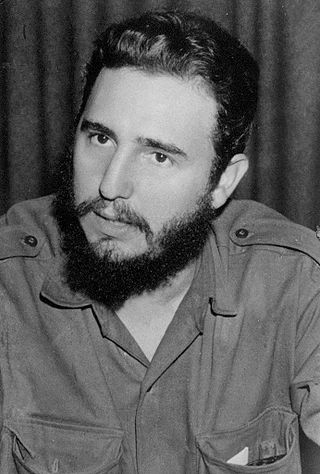
Fidel Alejandro Castro Ruz was a Cuban revolutionary and politician who was the leader of Cuba from 1959 to 2008, serving as the prime minister of Cuba from 1959 to 1976 and president from 1976 to 2008. Ideologically a Marxist–Leninist and Cuban nationalist, he also served as the first secretary of the Communist Party of Cuba from 1965 until 2011. Under his administration, Cuba became a one-party communist state; industry and business were nationalized, and socialist reforms were implemented throughout society.
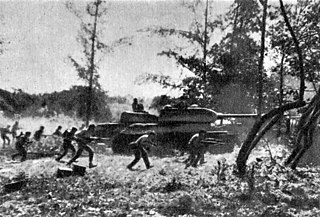
The Bay of Pigs Invasion was a failed military landing operation on the southwestern coast of Cuba in 1961 by the United States of America and the Cuban Democratic Revolutionary Front (DRF), consisting of Cuban exiles who opposed Fidel Castro's Cuban Revolution, clandestinely financed and directed by the U.S. government. The operation took place at the height of the Cold War, and its failure influenced relations between Cuba, the United States, and the Soviet Union.
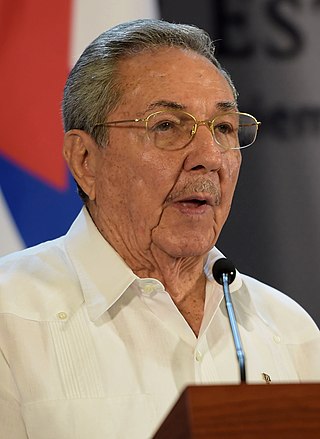
Raúl Modesto Castro Ruz is a Cuban retired politician and general who served as the first secretary of the Communist Party of Cuba, the most senior position in the one-party communist state, from 2011 to 2021, and President of Cuba between 2008 and 2018, succeeding his brother Fidel Castro.
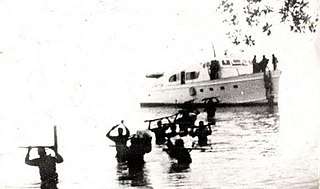
Granma is a yacht that was used to transport 82 fighters of the Cuban Revolution from Mexico to Cuba in November 1956 to overthrow the regime of Fulgencio Batista. The 60-foot diesel-powered vessel was built in 1943 by Wheeler Shipbuilding of Brooklyn, New York, as a light armored target practice boat, US Navy C-1994, and modified postwar to accommodate 12 people. "Granma", in English, is an affectionate term for a grandmother; the yacht is said to have been named for the previous owner's grandmother.
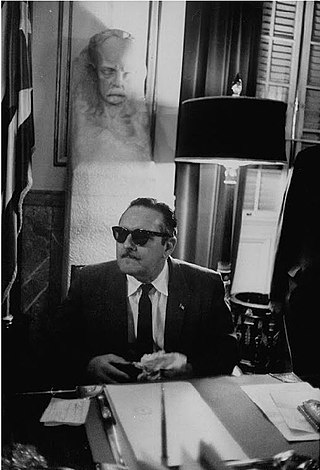
Manuel Urrutia Lleó was a liberal Cuban lawyer and politician. He campaigned against the Gerardo Machado government and the dictatorial second presidency of Fulgencio Batista during the 1950s, before serving as president in the revolutionary government of 1959. Urrutia resigned his position after only seven months, owing to a series of disputes with revolutionary leader Fidel Castro, and emigrated to the United States shortly afterward.
The Cuban–American lobby are various groups of Cuban exiles in the United States and their descendants who have historically influenced the United States' policy toward Cuba. In general usage, this refers to anti-Castro groups.

Armando Enrique Hart Dávalos was a Cuban politician and a Communist leader. His grandfather was born in the American state of Georgia and emigrated to Cuba as a child.

Modern diplomatic relations between Cuba and the United States are cold, stemming from historic conflict and divergent political ideologies. The two nations restored diplomatic relations on July 20, 2015, after relations had been severed in 1961 during the Cold War. The U.S. has maintained a comprehensive trade embargo against Cuba since 1958. The embargo includes restrictions on all commercial, economic, and financial activity, making it illegal for U.S. corporations to do business with Cuba.
The 2006–2008 Cuban transfer of presidential duties was the transfer of the title of president and presidential duties from longtime Cuban leader Fidel Castro to his brother, First Vice President Raúl Castro, the next-in-line-of-succession person in Cuba, following Fidel's operation and recovery from an undisclosed digestive illness believed to be diverticulitis. Although Raúl Castro exercised the duties of president, Fidel Castro retained the title of president of the Council of State of Cuba and president of the Council of Ministers of Cuba, during this period.

Miguel Díaz-Canel Bermúdez is a Cuban politician and engineer. He has served as the 8th First Secretary of the Communist Party of Cuba since 2021 and as the 17th President of Cuba since 2019. In his capacity as First Secretary he is the most powerful person in the Cuban government.

The Embassy of the United States of America in Havana is the United States of America's diplomatic mission in Cuba. On January 3, 1961, U.S. President Dwight D. Eisenhower severed relations following the Cuban Revolution of the 1950s. In 1977, U.S. President Jimmy Carter and Cuban leader Fidel Castro signed an Interests Sections Agreement that permitted each government to operate from its former embassy in Havana and Washington D.C., which were called Interests Sections; they were prohibited from flying their respective flags. Cuban President Raúl Castro and U.S. President Barack Obama restored full diplomatic connections on July 20, 2015.
Events in the year 1969 in Mexico.
The following lists events that happened during 2014 in Cuba.
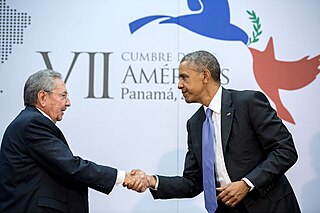
The Cuban thaw was a normalization of Cuba–United States relations that began in December 2014, ending a 54-year stretch of hostility between the nations. In March 2016, Barack Obama became the first U.S. president to visit Cuba since Calvin Coolidge in 1928. The normalization of relations lasted from July 2015 to June 2017, with relations further deteriorating under Presidents Donald Trump, and later, Joe Biden.

Former first secretary of the Communist Party of Cuba and president of the Council of State, Fidel Castro died of natural causes at 22:29 (CST) on the evening of 25 November 2016, at the age of 90. His brother, Raúl Castro, who was president of the Council of State at the time, announced Fidel's death on state television. One of the most controversial political leaders of his era, Castro both inspired and dismayed people across the world during his lifetime. The London Observer stated that the only thing that his "enemies and admirers" agreed upon was that he was "a towering figure" in world affairs who "transformed a small Caribbean island into a major force in world affairs". The Daily Telegraph noted that across the world he was "either praised as a brave champion of the people, or derided as a power-mad dictator." Castro's body was cremated and his ashes were interred in Santiago de Cuba on 4 December 2016, and hundreds of thousands of Cubans commemorated the event.
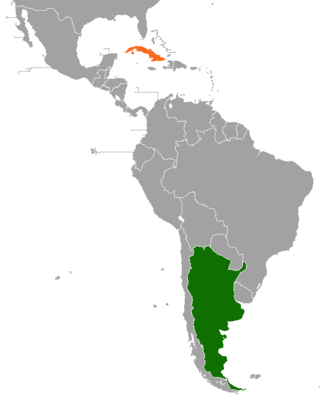
Current and historical relations between Argentina and Cuba, have existed for over a century. Both nations are members of the Community of Latin American and Caribbean States, Latin American Integration Association, Organization of American States and the Organization of Ibero-American States.

Fidel Ángel Castro Díaz-Balart was a Cuban nuclear physicist and government official. Frequently known by the diminutive Fidelito, he was the eldest son of Cuban leader Fidel Castro and his first wife, Mirta Díaz-Balart.
Events in the year 2019 in Cuba.